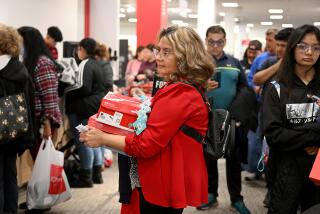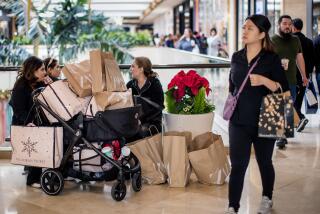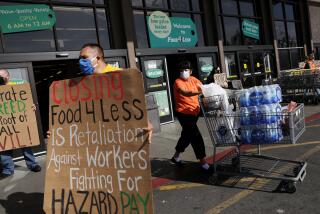Retail workers fear for their safety this Black Friday: ‘An anxiety attack waiting to happen’
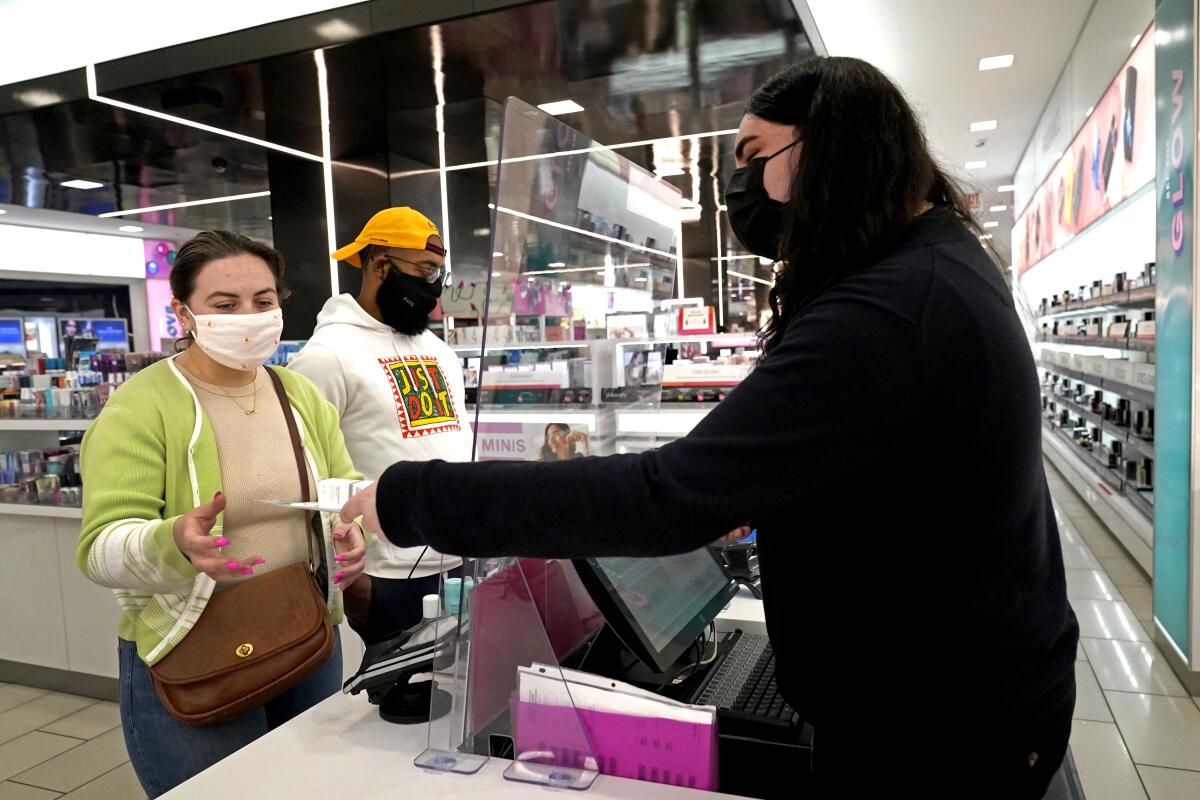
- Share via
Black Friday leaves Andrea Hernandez breathless.
She’s worked the day after Thanksgiving at a mall shoe store in Los Angeles the last three years, spending her shift running back and forth, hauling sneakers from the stockroom to the waiting feet of customers — and trying to keep her cool when someone inevitably yells at her for disappearing too long.
For retail workers, Black Friday is, as Hernandez puts it, the “most dreaded day of the year.” But this year, the day they hate has also become one they fear.
With coronavirus infections rising across much of the United States, what is historically one of America’s busiest shopping days brings real risk. Some regions have established occupancy restrictions, including California, where the average number of new coronavirus cases has tripled in the last month alone. But even here, where safety rules are more stringent than in many states, workers are bracing for a high volume of shoppers and the danger that comes with the traffic.
With the virus infecting more Californians every day than at any previous point this year, Gov. Gavin Newsom pulled the “emergency brake,” rolling out new restrictions last week ahead of the Thanksgiving holiday. Vast swaths of the state now fall in the purple tier — the strictest — of the state’s reopening plan. The rules allow retail stores and indoor malls in these counties to open, but with capacity limited to 25%. Additional regulations cutting occupancy to 20% in nonessential retail stores could soon come to Los Angeles County, where officials on Tuesday began to outline a new “Safer at Home” order, as daily coronavirus infections surge to record levels.
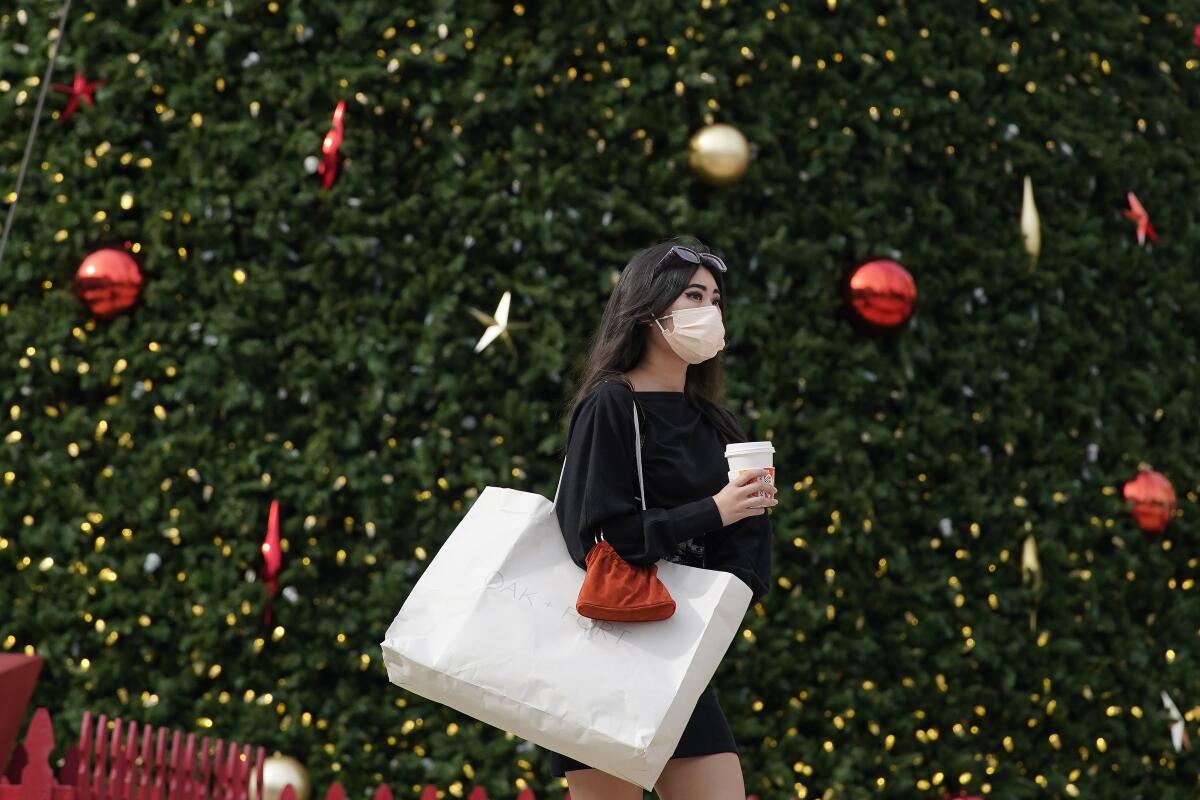
Similar tightening of rules is happening in other states, including Nevada and New York. North Carolina’s governor strengthened mask-wearing rules but did not tighten occupancy limits on businesses. In Utah, where a statewide mask mandate was implemented in response to a surge of cases this month, the governor relaxed restrictions on social gatherings just before Thanksgiving. Elsewhere, the holiday season is business as usual. Florida and Georgia long ago lifted statewide restrictions on businesses meant to limit the spread of the coronavirus and do not require mask-wearing.
Retail experts have said stores shouldn’t expect the mass crowds they usually see on Black Friday. The draw of the frantic shopping day has diminished over the years as e-commerce has grown. And with coronavirus cases increasing more people will probably turn to online retailers. But that doesn’t mean stores won’t see a rise in customers Friday. Workers say they’ve already seen an uptick in the number of shoppers as the holiday season approaches.
Some major retailers have introduced their own safety measures for the holiday season. Target, for example, implemented contactless self-checkout, doubled the number of parking spots for its curbside pickup service and spread its Black Friday deals throughout November to discourage crowding, spokesperson Jake Anderson said in an email.
But workers worry it won’t be enough to protect them.
Angel Ponce, 22, has taken to wearing two masks, one layered on top of the other, because it makes him feel safer working the electronics department at a Target in Van Nuys. In an attempt to stem the flow of customers, he said, he repeatedly tells shoppers the holiday deals have already rolled out online and will still be available after Black Friday.
“Every day I see more and more people come into the store to look for their new hot electronic,” Ponce said. “That worries me. Despite all the information out there about COVID and the precautions we should be taking — stay at home, wear a mask, don’t go out if you don’t need to — a lot of people just don’t listen to that.”
He has already gotten a taste of what managing an influx of customers might feel like. With the release of Xbox Series X and PlayStation 5 this month, Ponce said, customers have been coming in to pepper him with questions about the consoles, even though they’ve been sold out for weeks.
“If [customers] could stop rushing into the store, that would be nice, so there wouldn’t be so many people and I wouldn’t increase my chances of possibly contracting something,” Ponce said.
“Every day is an anxiety attack waiting to happen,” said Hernandez, the shoe store employee who spoke on the condition that The Times not identify the specific retailer where she works due to concerns it could put her job in jeopardy.
Employees at her shop wash their hands, wear masks, limit store capacity and disinfect benches and other surfaces regularly, Hernandez said. But she worries about crowding at the mall. She says the security team doesn’t want long lines outside stores, leaving her and other employees feeling pressured to let in more customers than they should.
“Although masks are required, people often walk around with their masks hanging down their ears, or just completely off because they’re indulging in a warm pretzel or a Frappuccino,” Hernandez said in an email.
When Hernandez politely asks customers to put on their mask, they often refuse, and even though she’s uncomfortable, she has no choice but to help them anyway.
At the beginning of the pandemic, GameStop employees at stores across California accused the company of staying open when nonessential businesses were supposed to shut down and failing to provide adequate disinfectant and other cleaning supplies.
Jacquelyn Frazer, 25, says she and GameStop have adapted to pandemic realities. But she has no idea what to expect on Black Friday this year. Usually, there’s a line at the Livermore, Calif., store before it even opens. The idea of managing crowds now is frightening, she said, especially because she lives with someone who has leukemia and is thus especially vulnerable to the coronavirus.
“We’ve accepted there’s a chance of us being exposed to it regardless, and we just have to do our best to take precautions,” Frazer said. “But the stress is still there.”
GameStop did not respond to multiple requests for comment.
A Nordstrom store in Westfield Santa Anita mall in Arcadia began counting customers at the door last week, when Newsom rolled out new occupancy restrictions. Sales associate Samuel Thorne, 28, said he’s been stretched thin as the company gears up for the holidays because of layoffs and cutbacks brought on by the pandemic.
Thorne often handles the kids department, which he said can get “a little crazy” because people have been cooped up at home for so long.
“Families are looking for any excuse to get out of the house,” he said. “Kids have tons of pent-up energy and don’t quite understand masks and social distancing, so it makes it stressful and difficult when you see the lack of awareness from families coming in to shop.”
Besides rambunctious children, Thorne said he hasn’t had any troublesome customers yet. If he’s asked someone to fix their mask or offered one to a maskless shopper, they’ve gone along with it.
Nordstrom did not respond to requests for comment on the company’s COVID-19 safety measures.
Thorne advises that if customers absolutely must shop in person, they should make a game plan ahead of time — create a list of the items and know what sizes they need, in order to get in and out quickly. Thorne also suggested shopping solo because bringing the whole family in tow just increases the risk.
“Retail therapy is definitely a thing people seem to be taking advantage of,” Thorne said. “I would hope people just understand we’re people too.”
More to Read
Inside the business of entertainment
The Wide Shot brings you news, analysis and insights on everything from streaming wars to production — and what it all means for the future.
You may occasionally receive promotional content from the Los Angeles Times.
